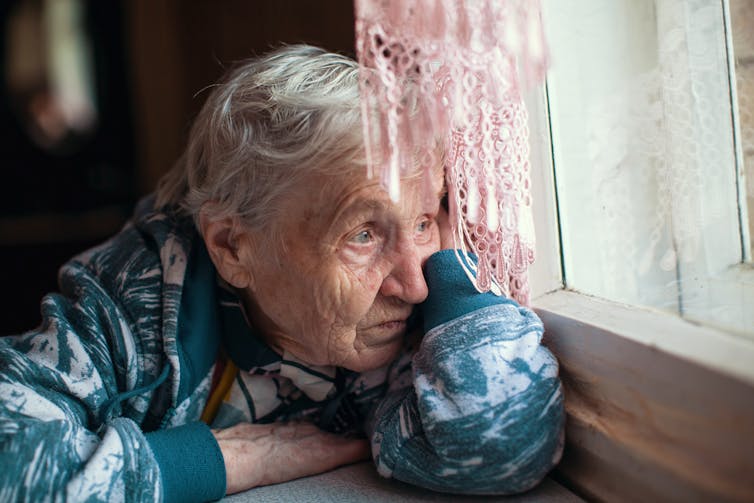Banning visitors to aged care during coronavirus raises several ethical questions – with no simple answers
- Written by Alison Rahn, Senior Research Officer, School of Social Sciences & Translational Health Research Institute (THRI), Western Sydney University
Physically, older people are among those most vulnerable to the coronavirus.
For those isolated in residential aged care or in the community, they’re also arguably the most vulnerable socially.
Reports from European and American care homes, where large clusters of residents have been infected, provide sobering reminders of the need to take precautions.
But some of these precautions – particularly banning visitors – raise ethical questions.
None offer simple answers. In an industry that’s already under-resourced and under-staffed, aged care providers are facing the challenge of balancing residents’ health and well-being, workplace health and safety and public health risk.
Read more: Why are older people more at risk of coronavirus?
Who is allowed to visit?
The Australian government advises visits to residential aged care facilities for the purpose of care and support are still permitted.
Visitors must be aged over 16, submit to health screening, stay for only a short time and remain at least 1.5 metres apart. One visit per resident per day is allowed, of up to two people. But visitors are urged to stay away if they don’t absolutely need to be there.
Further restrictions apply in Tasmania – only visitors providing end-of-life support or essential health care are permitted.
But both not-for-profit and for-profit aged care providers are increasingly opting to go further than government advice and banning visitors altogether.
Many of these providers publicly state they will allow visits to their residents at the end of life while others have not communicated their policies on this.
 Loneliness and social isolation have been linked to poorer health outcomes.
Shutterstock
Loneliness and social isolation have been linked to poorer health outcomes.
Shutterstock
A workplace for some is a home for others
From the perspective of nurses and other clinicians, aged care facilities are workplaces and preventing infections is the priority.
This is not the case for residents. To them, the facility is their home, and in order to maintain their sense of self, residents need ongoing bridges with the outside world. This includes family, friends and community networks.
Providers must remember older adults living in aged care are approaching the end of their lives. A portion will not outlive the COVID-19 crisis, whether they acquire the virus or not.
Some may even have their deaths hastened by the resultant stress, loneliness or social isolation.
What about spouses?
Earlier in the pandemic’s trajectory, Chief Medical Officer Brendan Murphy said “you cannot completely deny access to an elderly person in a residential facility to their closest next of kin”.
A blanket ban on visitors certainly raises ethical concerns. There is a very real risk residents’ social and emotional needs will be overlooked.
For instance, in cases where one spouse lives in residential care and the other doesn’t, is it ethical to expect couples to go without seeing each other for up to six months?
Family as caregivers
While visits from family members can bring joy to people in aged care, often their role is more than this.
Many residents rely on daily care provided by spouses and/or adult children. This is especially true for those with dementia, those who need assistance with eating and those with mobility issues who require extra assistance with toileting.
The chair of the aged care royal commission recently indicated if family visits are to be banned, facilities must put measures in place to deal with the negative consequences.
This may mean deploying extra personnel to attend to residents’ supplementary care needs, and providing creative technological solutions to enable residents to stay in touch with their families and communities.
Some families have expressed concern that COVID-19 lockdowns may increase the risk of neglect and/or abuse in residential aged care.
In their absence, who will provide independent oversight of residents’ well-being? In cases of neglect or abuse, who will advocate for residents? What measures can be put in place to protect residents?
While the royal commission has been overshadowed lately, we must not forget it remains ongoing.
Involving residents and families
The most ethical approach is for providers to involve residents and their families in decision-making. The aged care quality standards – which enshrine consumer dignity and choice – don’t become redundant just because we’re in a pandemic.
It’s important for providers to ascertain what matters to residents. For many, their priority is likely to be quality of life, not length of life.
 Residents must be offered solutions to stay connected with friends, family and communities.
Shutterstock
Residents must be offered solutions to stay connected with friends, family and communities.
Shutterstock
During COVID-19, we need to find creative solutions that meet residents’ needs, without putting others at risk.
Some families have pulled their relatives out of aged care in desperation. But have residents been offered the option to move out and live with family in a well-planned way?
If facilities are able to re-organise internal spaces, especially where independent living units and residential care are co-located, have residents and family members been offered the option of living together on site, away from other residents?
There are no simple answers, but these may be examples of workable compromises.
Authors: Alison Rahn, Senior Research Officer, School of Social Sciences & Translational Health Research Institute (THRI), Western Sydney University





